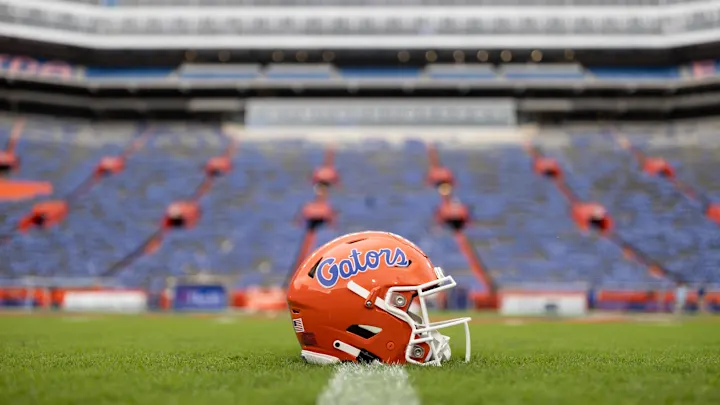Florida Gators Freshman Justin Watkins Arrested on Felony Domestic Violence Charges, Prompting Team Suspension
In a disheartening development for the University of Florida’s football program, incoming freshman Justin Watkins was arrested on July 24, 2018, facing multiple serious charges, including domestic battery by strangulation and false imprisonment/kidnapping, both classified as third-degree felonies. Additionally, he was charged with two counts of misdemeanor battery. The arrest occurred just days after Watkins enrolled at UF for the Summer B semester, and it marked his second legal incident within a span of two months.
According to the arrest report, the alleged incident took place in Watkins’ on-campus dormitory room. The victim, identified as Watkins’ girlfriend, reported that he physically assaulted her by slapping, punching, and choking her while restraining her on the bed and blocking the door to prevent her from leaving. She managed to escape by spraying him with mace. Visible bruises and injuries on the victim corroborated her account. The Gainesville Police Department responded promptly, leading to Watkins’ arrest.
This arrest followed a prior incident in May 2018, where Watkins was arrested for trespassing after allegedly kicking his girlfriend’s car, breaking her phone, and following her to a high school. He was charged with trespassing on public school grounds. Despite not being enrolled at UF at that time, Watkins was still considered a part of the Gators’ football program.
In response to the July arrest, UF head coach Dan Mullen suspended Watkins indefinitely from all team activities. The university also initiated its own investigation into the matter. Given the severity of the charges and Watkins’ history of legal issues, it was widely anticipated that he would not return to the team. On July 27, 2018, Watkins announced via Twitter that he was leaving the University of Florida to “better my opportunities,” effectively ending his association with the Gators.
Watkins, a four-star recruit from Clermont, Florida, had been a highly anticipated addition to the Gators’ 2018 signing class. Ranked as the 89th-best player nationally and the 20th-best in Florida by 247Sports, he was expected to contribute significantly to the team’s receiving corps. His departure marked a significant setback for the program, both in terms of talent and public image.
This incident is part of a troubling pattern of legal issues involving UF football players. In February 2012, tight end A.C. Leonard was arrested for misdemeanor domestic battery after an altercation with his girlfriend. He was subsequently suspended indefinitely from the team. More recently, in March 2020, freshman defensive back Deiondre Porter was arrested on four felony charges, including firing a gun in the direction of his pregnant girlfriend. He was suspended indefinitely from the team.
These incidents have prompted the University of Florida to reexamine its policies regarding athlete conduct and discipline. The UF Athletic Association has emphasized its zero-tolerance stance on such behavior, underscoring the importance of accountability both on and off the field. The university’s response to these events has included suspensions, terminations, and public statements reinforcing the commitment to maintaining a respectful and safe environment for all students and staff.
The arrest of Justin Watkins serves as a stark reminder of the challenges that collegiate athletic programs face in managing the behavior of student-athletes. While the talent and potential of recruits are often highlighted during the recruitment process, incidents like this underscore the necessity of comprehensive support systems, including counseling and education on appropriate conduct, to ensure that athletes uphold the values and standards expected of them.
In the aftermath of Watkins’ departure, the Gators’ coaching staff and athletic department have likely intensified their efforts to foster a culture of responsibility and integrity within the program. This includes implementing stricter screening processes during recruitment, providing ongoing education on personal conduct, and offering support services to help athletes navigate the pressures and challenges associated with their roles as public figures.
While the incident involving Justin Watkins was undoubtedly a setback for the Florida Gators football program, it also serves as an opportunity for reflection and growth. By addressing the underlying issues that contribute to such behavior and taking proactive steps to prevent future occurrences, the program can work towards rebuilding trust and ensuring that its athletes represent the university in a manner that reflects its core values.
As for Justin Watkins, his departure from the University of Florida marks a pivotal moment in his life and career. The legal proceedings and the public nature of the charges will have lasting implications for his future, both personally and professionally. It remains to be seen how he will address these challenges and what path he will choose moving forward.
In conclusion, the arrest and subsequent departure of Justin Watkins from the Florida Gators football program highlight the complexities and responsibilities associated with collegiate athletics. While the focus often centers on athletic performance, incidents like this remind us of the importance of character and conduct in shaping the reputation and success of a program. The University of Florida’s response to this situation will likely influence how similar cases are handled in the future, setting a precedent for accountability and the prioritization of student welfare.



